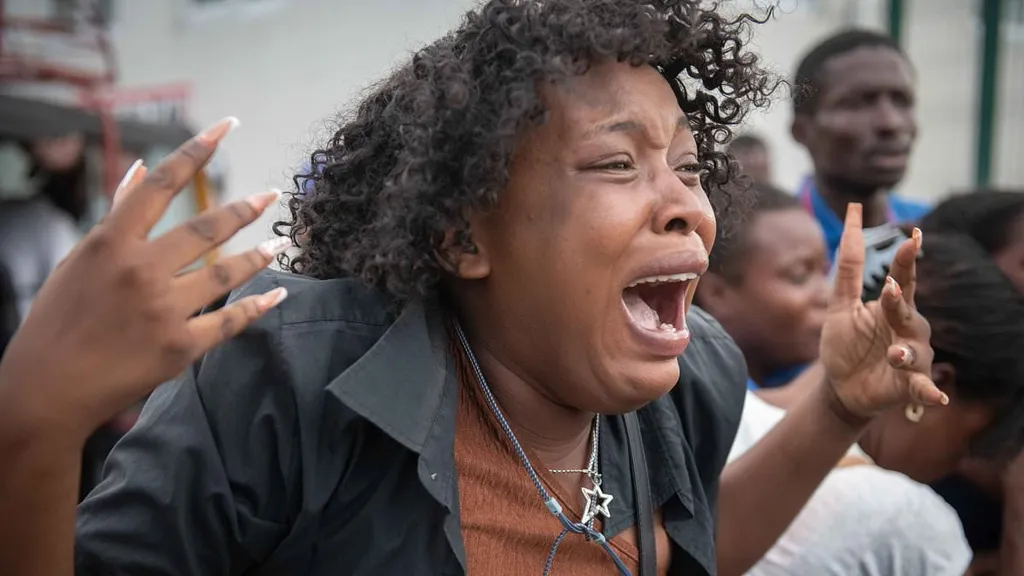Two reporters were killed and several were wounded on Tuesday in a gang attack in Haiti on the reopening of Port-au-Prince's biggest public hospital. A police officer was also killed in the attack.
Street gangs forced the closure of the General Hospital early this year and authorities had pledged to reopen the facility in Haiti's capital on Christmas Eve, but as journalists gathered to cover the event, suspected gang members opened fire.
Videos from local media livestreaming the attack showed journalists huddled on the floor of the hospital lobby as a barrage of bullets flew by. Some appeared to have been hit and were bleeding.
Armed gangs in Haiti, with near-total control over capital Port-au-Prince and wide remit over the rest of the country, have targeted hospitals to show their muscle over the government, forcing most to shut down.
Robest Dimanche, a spokesman for the Online Media Collective, identified the killed journalists as Markenzy Nathoux and Jimmy Jean. Dimanche said an unspecified number of reporters had also been caught up in the attack, which he blamed on the Viv Ansanm coalition of gangs.
The Haitian Association of Journalists confirmed two reporters and a police officer were killed, while seven reporters were wounded in what it called 'a macabre scene comparable to terrorism, pure and simple.'
Haiti's interim president, Leslie Voltaire, said in an address to the nation that journalists and police were among the victims of the attack. He did not specify the casualty numbers or provide a breakdown.
'I send my sympathies to the people who were victims, the national police and the journalists,' Voltaire said. 'What happened today is unacceptable.'
Later, the government put out a statement saying it is 'responding firmly to the attack.'
'This heinous act, which targets an institution dedicated to health and life, constitutes an unacceptable attack on the very foundations of our society,' it said.
The State University of Haiti Hospital, known locally as the General Hospital, is the country's largest public hospital but it has been closed since a March surge in gang attacks that saw former Prime Minister Ariel Henry ousted from power.
In July, authorities celebrated retaking control of the hospital with a press conference in the facility, but Conille was forced to flee alongside security officers and journalists under a flurry of gunfire.
The hospital is in downtown Port-au-Prince, a stone's throw from the central Champ de Mars square, an area that has seen frequent gun battles and clashes between police and a city-wide alliance of gangs known as Viv Ansanm.
Street gangs have taken over an estimated 85 percent of Port-au-Prince and have also targeted the main international airport and Haiti's two largest prisons.
Neighboring countries have been slow to deliver on promises of security support for the Caribbean nation.
An international mission approved last year has so far seen just a fraction of troops deploying, while Haitian calls to shore up its resources by converting it to a peacekeeping force met opposition at the U.N. Security Council.
Johnson 'Izo' André, considered Haiti´s most powerful gang leader and part of the Viv Ansanm group of gangs, which that has taken control of much of Port-au-Prince, posted a video on social media claiming responsibility for the attack.
The video said the gang coalition had not authorized the hospital's reopening.
Haiti has seen journalists targeted before.
In 2023, two local journalists were killed in the space of a couple of weeks - radio reporter Dumesky Kersaint was fatally shot in mid-April that year, while journalist Ricot Jean was found dead later that month.
In July, former Prime Minister Garry Conille visited the Hospital of the State University of Haiti, more widely known as the General Hospital, after authorities regained control of it from gangs.
The hospital had been left ravaged and strewn with debris. Walls and nearby buildings were riddled with bullet holes, signaling fights between police and gangs.
The hospital is across the street from the national palace, the scene of several battles in recent months.
Gang attacks have pushed Haiti´s health system to the brink of collapse with looting, setting fires, and destroying medical institutions and pharmacies in the capital.
The violence has created a surge in patients and a shortage of resources to treat them.
Haiti's health care system faces additional challenges during the rainy season, which is likely to increase the risk of water-borne diseases.
Poor conditions in camps and makeshift settlements have heightened the risk of diseases like cholera, with over 84,000 suspected cases in the country, according to UNICEF.
